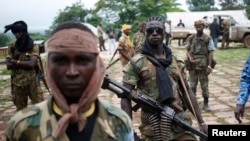A new survey indicates the number of people killed during the height of the Central African Republic conflict has been underestimated.
Doctors Without Borders (MSF - Medecins San Frontieres) says a survey of thousands of CAR refugees in neighboring Chad finds that nearly 2,600 people were killed in the unrest between November 2013 and April of this year.
Relief organizations previously estimated that between 1,000 and 2,000 people died in fighting between the mostly Muslim ex-Seleka rebels and mostly Christian anti-balaka militias.
In its report Wednesday, MSF said more than a quarter of the refugees surveyed had lost at least two family members. Most of the deaths were from gunshots, machete wounds or explosions.
CAR's unrest began last year when Seleka rebels toppled President Francois Bozize. Subsequent attacks and looting by Seleka forces sparked retaliatory attacks by the anti-Balaka.
Delphine Chedorge, MSF's head of mission in CAR, told VOA that the unrest is continuing.
"All communities have been affected by the violence and it continues today," said Chedorge. "And there is a lot of violence between the communities, due to criminality, due to some of the unrest in the conflict in Central Africa."
The United Nations says the CAR's unrest has forced about one million people to flee their homes. Many were Muslims fleeing attacks by the anti-Balaka.
In April, the U.N. Security Council agreed to authorize a nearly 12,000-member U.N. peacekeeping force for CAR. The force takes over in mid-September.
Currently, a 6,000-troop African mission and about 2,000 French troops have been trying to restore order in the country.




